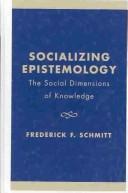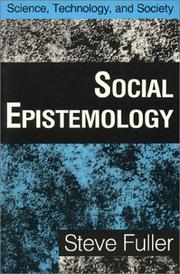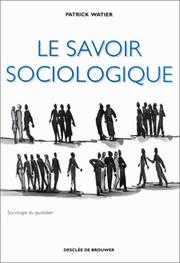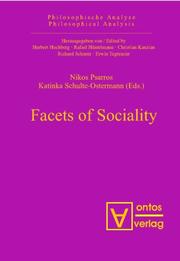| Listing 1 - 10 of 58 | << page >> |
Sort by
|

ISBN: 0847679594 Year: 1994 Volume: *1 Publisher: Boston Rowman and Littlefield Publishers, Inc.
Abstract | Keywords | Export | Availability | Bookmark
 Loading...
Loading...Choose an application
- Reference Manager
- EndNote
- RefWorks (Direct export to RefWorks)
Epistémologie sociale --- Social epistemology --- Sociale epistemologie --- Epistemology, Social --- Knowledge, Theory of --- Social role --- Knowledge, Sociology of
Book
ISBN: 9780199577477 Year: 2010 Publisher: Oxford Oxford University Press
Abstract | Keywords | Export | Availability | Bookmark
 Loading...
Loading...Choose an application
- Reference Manager
- EndNote
- RefWorks (Direct export to RefWorks)
Social epistemology --- Epistemology, Social --- Knowledge, Theory of --- Social role --- Knowledge, Sociology of --- Theory of knowledge

ISBN: 9780199276011 9780199276004 0199276013 0199276005 0191706116 9786611164669 1281164666 0191534730 9780191534737 9781281164667 Year: 2011 Publisher: Oxford Clarendon
Abstract | Keywords | Export | Availability | Bookmark
 Loading...
Loading...Choose an application
- Reference Manager
- EndNote
- RefWorks (Direct export to RefWorks)
Testimony is a crucial source of knowledge: we are to a large extent reliant upon what others tell us. It has been the subject of much recent interest in epistemology, and this volume collects twelve original essays on the topic by some of the world's leading philosophers. It will be the starting point for future research in this fertile field. Contributors Robert Audi, C. A. J. Coady, James Van Cleve, Elizabeth Fricker, Richard Fumerton, Sanford C. Goldberg, Peter Graham, Jennifer Lackey, Keith Lehrer, Richard Moran, Frederick F. Schmitt, Ernest Sosa - ;Testimony is a crucial source of knowle
Theory of knowledge --- Epistémologie sociale --- Social epistemology --- Epistemology, Social --- Knowledge, Theory of --- Social role --- Knowledge, Sociology of --- Social epistemology.
Book
ISBN: 0472127829 Year: 1996 Publisher: Ann Arbor, Michigan : University of Michigan Press,
Abstract | Keywords | Export | Availability | Bookmark
 Loading...
Loading...Choose an application
- Reference Manager
- EndNote
- RefWorks (Direct export to RefWorks)
Inquiry (Theory of knowledge) --- Social epistemology --- China --- Civilization --- Epistemology, Social --- Knowledge, Theory of --- Social role --- Knowledge, Sociology of

ISBN: 9780199575619 9780199219162 Year: 2010 Publisher: Oxford Oxford University Press
Abstract | Keywords | Export | Availability | Bookmark
 Loading...
Loading...Choose an application
- Reference Manager
- EndNote
- RefWorks (Direct export to RefWorks)
Theory of knowledge --- Social epistemology. --- Witnesses. --- Social epistemology --- Witnesses --- Testimony --- Evidence (Law) --- Eyewitness identification --- Epistemology, Social --- Knowledge, Theory of --- Social role --- Knowledge, Sociology of
Book
ISBN: 9780195334616 9780195334531 0195334612 0195334531 Year: 2011 Publisher: Oxford: New York: Oxford university press,
Abstract | Keywords | Export | Availability | Bookmark
 Loading...
Loading...Choose an application
- Reference Manager
- EndNote
- RefWorks (Direct export to RefWorks)
What if anything justifies us in believing the testimony of others? How should we react to disagreement between ourselves and our peers, and to disagreement among the experts when we ourselves are novices? Can beliefs be held by groups of people in addition to the people composing those groups? And if so, how should groups go about forming their beliefs? How should we design social systems, such as legal juries and scientific research-sharing schemes, to promote knowledge among the people who engage in them? When different groups of people judge different beliefs to be justified, how can we tell which groups are correct? These questions are at the heart of the vital discipline of social epistemology. The classic articles in this volume address these questions in ways that are both cutting-edge and easy to understand. This volume will be of great interest to scholars and students in epistemology.
Theory of knowledge --- Social epistemology --- Epistemology. --- Social epistemology. --- Epistémologie sociale --- Epistemology, Social --- Knowledge, Theory of --- Social role --- Knowledge, Sociology of

ISBN: 0253352274 Year: 1988 Publisher: Bloomington Indiana university press
Abstract | Keywords | Export | Availability | Bookmark
 Loading...
Loading...Choose an application
- Reference Manager
- EndNote
- RefWorks (Direct export to RefWorks)
Knowledge, Sociology of --- Social epistemology --- Epistemology, Social --- Knowledge, Theory of --- Social role --- Knowledge, Theory of (Sociology) --- Sociology of knowledge --- Communication --- Public opinion --- Sociology --- Knowledge, Sociology of. --- Social epistemology.
Book
ISBN: 0892641207 0472901788 Year: 1996 Publisher: Ann Arbor University of Michigan. Center for Chinese studies
Abstract | Keywords | Export | Availability | Bookmark
 Loading...
Loading...Choose an application
- Reference Manager
- EndNote
- RefWorks (Direct export to RefWorks)
Inquiry (Theory of knowledge) --- Social epistemology --- S12/0217 --- Epistemology, Social --- Knowledge, Theory of --- Social role --- Knowledge, Sociology of --- China: Philosophy and Classics--Epistemology --- China --- Civilization

ISBN: 2220046990 9782220046990 Year: 2000 Publisher: Paris Desclée de Brouwer
Abstract | Keywords | Export | Availability | Bookmark
 Loading...
Loading...Choose an application
- Reference Manager
- EndNote
- RefWorks (Direct export to RefWorks)
Sociology --- Socialization --- Sociologie --- Socialisation --- Social epistemology --- #SBIB:316.23H1 --- #SBIB:316.23H2 --- Epistemology, Social --- Knowledge, Theory of --- Social role --- Knowledge, Sociology of --- Kennissociologie --- Sociologie van de wetenschappen


ISBN: 3110326930 9783110326932 3110326590 9783110326598 9783938793398 3938793392 9783110326598 Year: 2013 Volume: Bd. 15 Publisher: Berlin Boston
Abstract | Keywords | Export | Availability | Bookmark
 Loading...
Loading...Choose an application
- Reference Manager
- EndNote
- RefWorks (Direct export to RefWorks)
The aim of this volume is to explore new approaches to the problem of the constitution of the various aspects of sociality and to confront these with received ideas. Therefore many of the contributions to this volume are devoted to a rather holistic and antireductionist conception of social objects, groups, joint actions and collective knowledge. The topics, that are dealt with are: a) the question of the ontological status of social objects and their relation to physical objects, b) collective agency and c) the question whether there can be shared knowledge and shared beliefs - a rather new t
Action theory --- Social interaction --- Social epistemology --- Epistemology, Social --- Knowledge, Theory of --- Social role --- Knowledge, Sociology of --- Goal-directed action --- Goal-directed behavior --- Theory, Action --- Psychology --- Sociology --- Philosophy
| Listing 1 - 10 of 58 | << page >> |
Sort by
|

 Search
Search Feedback
Feedback About UniCat
About UniCat  Help
Help News
News